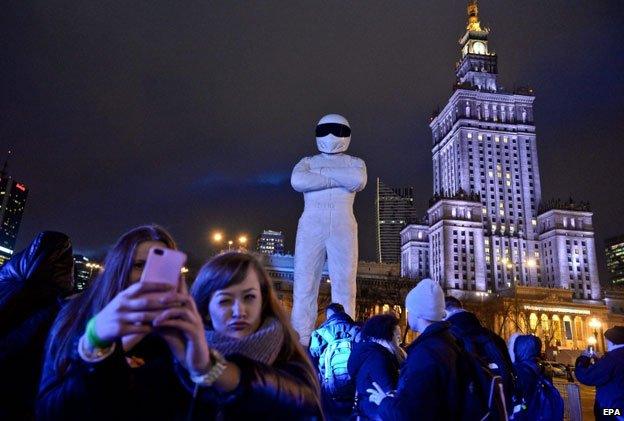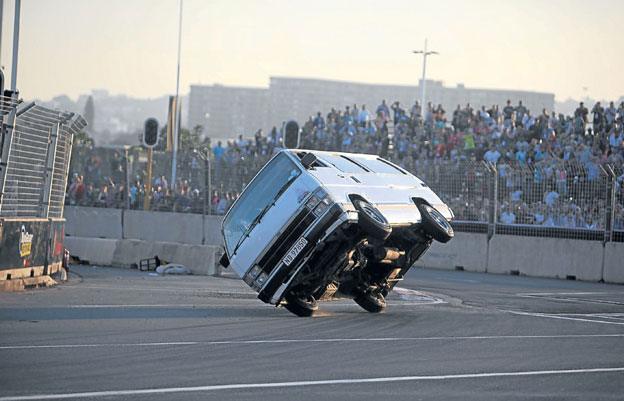How Top Gear conquered the world
- Published

A 10m-high statue of the Stig in Warsaw (2015)
It's hard to go anywhere in the world these days and not find that Top Gear has got there before you. The programme may have begun on regional television in the UK - but it's now viewed in pretty much every region of the globe, writes Daniel Silas Adamson.
The taxi was a beaten up Toyota with half a million kilometres on the clock and an amulet of the Virgin Mary twirling from the rear-view mirror. The driver was a Quechua Indian called Ricardo, who knew every bend in the Peruvian dirt roads around the old Inca city of Sayhuite and who, when he found out I was British, had just one question: "Who is the Stig?"
It was not the first time I'd been reminded of Top Gear in some far-flung corner of the world. A few years earlier I pulled over at an outdoor roadside cafe in the Jordan Valley, not far from Jericho in the West Bank. It was late at night, but there were 20 or so Palestinian men sitting around a screen on plastic chairs, smoking shisha pipes and watching The Star in a Reasonably Priced Car.
Almost a decade before that, I'd seen a handful of Indian men gathered under a corrugated tin roof in Dharavi, Mumbai's biggest slum, watching the programme on a TV set rigged illegally into the power cables that ran above the shacks. One of the men had already incurred the undisguised contempt of his wife, who was hard at work, but he seemed to think this was a price worth paying for an hour with Jeremy Clarkson. Clarkson would surely have approved.

Jeremy Clarkson filming in Moscow (2012)
The formula - a macho, wise-cracking, stunt-filled show, fronted by by three ageing men with questionable taste in denim and a proclivity for infantile jokes - seems to float effortlessly across barriers of language, culture, and social class.
In Iran, where Top Gear is broadcast by BBC Persian TV (PTV), the voice actor who dubs Clarkson into Farsi, Mozaffar Shafeie, has become a star in his own right, external. When an episode of the programme was dropped in 2012 to make space for an interview with Hillary Clinton, the channel was bombarded with complaints from Iranian fans. "Hillary Clinton has got many things to say about Iran," said Clarkson afterwards. "You'd have thought that Iranians would have found this relatively interesting - more interesting than three fat old men falling over."
The show's appeal in Iran, says Darius Bazargan, a British documentary maker, comes not just from the cars and the stunts but also from Clarkson's vivid turn of phrase. "He once described a gear shift as being 'as smooth as licking honey from a woman's naked body', and the producers take a lot of effort to get the translation right… you would never hear a phrase like that on Iranian state television."
One of Bazargan's friends recently found, as I did in Peru, that for many people around the world Top Gear is now an emblem of the UK - as much or more than Manchester United or James Bond. On a trip to Iraqi Kurdistan, he found there were two pressing issues people wanted to talk about after discovering they had a British guest: the chances of British military intervention against the jihadists, and their favourite episodes of Top Gear.

Top Gear festival in Durban, South Africa (2012)
And it's not just the men. Given that Clarkson has been fending off accusations of sexism for decades, it's surprising to find that some 40% of the show's viewers are women.
"My wife also watches the programme, not just because of the cars but because it's a fantastically entertaining show," says Hormuzd Sorabjee, editor of Autocar India magazine. "A lot of Indians, men and women, find Jeremy very amusing. He takes the mickey out of a lot of people, and I can see why some of them might get upset. But there's nothing below the belt, I don't think."
Top Gear's executive producer, Andy Wilman, put it this way in an interview with CBS News a few years ago: "It's a journey into the male mind, which I believe, is a really, potentially very funny place - because let's face it, nothing happens there."
And if this is true anywhere, it is true everywhere.
Subscribe to the BBC News Magazine's email newsletter to get articles sent to your inbox.